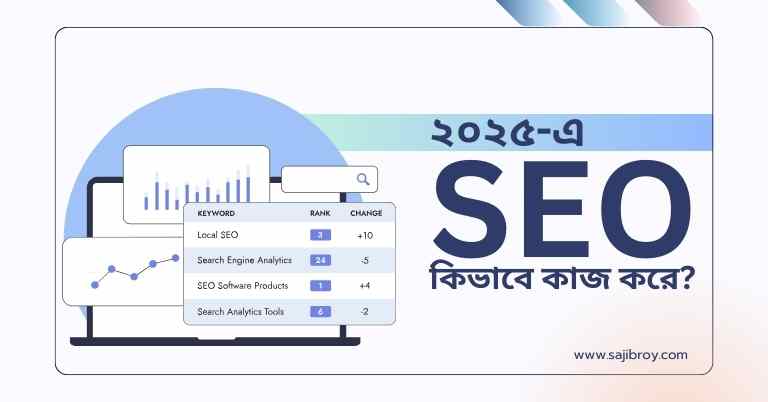To predict your SEO success, analyze important metrics like organic traffic, keyword rankings, and conversion rates. These will provide insights into the effectiveness of your SEO strategies and help measure your website’s performance in search engine results pages (SERPs).
Understanding how well your website performs in terms of SEO is crucial for its success. By predicting your SEO success, you can assess the effectiveness of your strategies and make informed decisions to improve your website’s visibility in search engine results.
Monitoring key metrics, such as organic traffic, keyword rankings, and conversion rates, enables you to gauge the impact of your SEO efforts and track your progress over time. We will explore the factors that contribute to SEO success and provide you with actionable insights to optimize your website’s performance. So, let’s dive in and uncover the secrets to predicting your SEO success.
Let's See the Topic Overview
Understanding The Ranking Factors
Welcome to the second part of our blog series on How to Predict Your SEO Success. In this section, we will delve into the crucial aspect of understanding the ranking factors that determine your SEO success. By gaining deeper insights into these factors, you can make informed decisions and implement effective strategies to improve your website’s visibility and drive organic traffic.
The Role Of On-page Optimization
On-page optimization plays a pivotal role in determining how search engines perceive and index your website. When crafting your web pages, it is imperative to optimize various on-page elements to enhance their relevance and crawlability. Here are some key on-page factors:
- Title Tags: These HTML elements specify the title of each page and should include relevant keywords to signal to search engines what the page is about. Additionally, creating engaging and clickable titles can also improve click-through rates in search engine result pages (SERPs).
- Meta Descriptions: These concise snippets provide a summary of your page’s content. Optimize them by incorporating targeted keywords while enticing users to click on your link.
- Header Tags: Properly structured header tags (H1 to H6) help organize and highlight the main sections of your content. Including relevant keywords in header tags can signal the importance of specific topics to search engines.
- Keyword Optimization: Strategically incorporating keywords throughout your content can improve its relevance to search queries. However, it is essential to strike a balance and avoid keyword stuffing, which can negatively impact user experience and lead to search engine penalties.
- URL Structure: Descriptive and keyword-rich URLs are more easily understood by both users and search engines. Ensure your URLs provide a clear indication of the page’s content and hierarchy.
The Importance Of Backlink Profile
Backlinks have long been considered a crucial ranking factor in SEO. Search engines, like Google, use the quantity and quality of backlinks pointing to a website as an indicator of its authority and trustworthiness. Here are some key points to consider:
- Quality over Quantity: While having a large number of backlinks can be beneficial, their quality holds more significance. Quality backlinks from reputable and relevant websites carry more weight and can positively impact your overall SEO performance.
- Anchor Text: The anchor text used in backlinks provides context for search engines. Incorporating relevant keywords in anchor text can help improve your website’s rankings for those particular keywords.
- Diversity of Sources: Building backlinks from a diverse range of sources, such as authoritative websites, industry directories, and social media platforms, can strengthen your backlink profile and enhance your website’s credibility.
The Impact Of User Experience Metrics
Search engines prioritize user experience, as it directly correlates with customer satisfaction. User experience metrics signal to search engines how users interact with your website. Here are some key metrics that can impact your SEO success:
- Page Load Speed: Slow-loading pages can deter users and negatively impact your search rankings. Make sure your website loads quickly across all devices and optimize images and scripts to reduce loading times.
- Mobile Compatibility: With the increasing dominance of mobile devices, ensuring your website is mobile-friendly is crucial. Responsive design and intuitive navigation on mobile devices improve user experience and contribute to higher search engine rankings.
- Bounce Rate: A high bounce rate indicates that users are leaving your website shortly after visiting it. Ensuring engaging and relevant content, easy navigation, and clear calls-to-action can help reduce bounce rates and improve search rankings.
- Click-Through Rate (CTR): Higher click-through rates in search engine result pages indicate that users find your content compelling and relevant. Crafting intriguing and keyword-rich meta titles and descriptions can improve CTR and boost organic traffic.
Understanding and optimizing these ranking factors can significantly improve your SEO success. By implementing effective on-page optimization strategies, building a quality backlink profile, and focusing on enhancing user experience, you can increase your website’s visibility, attract targeted traffic, and ultimately achieve your SEO goals. Stay tuned for the next part of our series, where we will explore other essential aspects of predicting your SEO success.
Analyzing Competitor Performance
When it comes to predicting your SEO success, analyzing your competitors’ performance is crucial. By understanding how your top competitors fare in terms of website structure, content strategy, and overall SEO efforts, you can gain valuable insights to improve your own SEO game plan.
Identifying Top Competitors
Before diving into the analysis, it’s important to identify who your top competitors are in the online arena. These are the websites that consistently rank well for your target keywords and attract a similar audience. Conducting thorough keyword research and utilizing SEO tools can help you unearth your top competitors.
Evaluating Their Website Structure
Once you’ve identified your top competitors, it’s time to evaluate their website structure. This includes analyzing factors such as:
- URL structure: Assess the clarity and relevance of their URLs, keeping an eye out for keyword optimization.
- Navigation: Evaluate the ease of navigation on their websites, ensuring that users can easily find the information they need.
- Site speed: Check how quickly your competitors’ websites load, as slow loading times can negatively impact user experience and SEO rankings.
- Mobile optimization: Determine if their websites are optimized for mobile devices, as Google prioritizes mobile-friendly websites in search results.
Assessing Their Content Strategy
An effective content strategy is pivotal for SEO success. When assessing your competitors’ content strategy, consider the following:
- Quality and relevance: Examine the quality and relevance of their content. Are they providing valuable information to their audience, and is their content aligned with their target keywords?
- Keyword usage: Analyze how your competitors incorporate target keywords into their content. Are they utilizing them naturally and strategically?
- Content formats: Identify what types of content your competitors are producing, such as blog posts, videos, infographics, etc. This can help you diversify your own content strategy.
- Social media integration: Look for signs of social media integration within their content, including social sharing buttons and links to their social media profiles
By analyzing your competitors’ performance in terms of website structure and content strategy, you can unearth valuable insights to strengthen your own SEO efforts. Utilizing this knowledge, you can make informed decisions to optimize your website, improve your content, and ultimately boost your SEO success.
Utilizing SEO Tools And Analytics
When it comes to predicting your SEO success, utilizing SEO tools and analytics is essential. These tools provide valuable insights into your website’s performance, keyword rankings, and overall optimization. Leveraging keyword research tools, tracking rankings with SEO analytics platforms, and analyzing website performance metrics are key steps to gaining an edge in the competitive world of SEO.
Leveraging Keyword Research Tools
Keyword research forms the foundation of any successful SEO strategy. By identifying the right keywords to target, you can drive targeted traffic to your website and optimize your content accordingly. There are various SEO tools available that simplify the process of keyword research and provide valuable data to help you make informed decisions.
Some popular keyword research tools include:
- Google Keyword Planner: This free tool by Google provides keyword ideas, search volume data, and competition analysis.
- Ahrefs: A comprehensive SEO tool that offers keyword research, competitor analysis, and backlink data.
- Semrush: Apart from keyword research, Semrush provides insights into competitor strategies, site audits, and backlink analysis.
Tracking Rankings With SEO Analytics Platforms
Monitoring your keyword rankings is crucial to measure the effectiveness of your SEO efforts. By tracking your rankings, you can identify areas where improvement is needed and adjust your strategy accordingly. SEO analytics platforms provide you with real-time data on your keyword rankings, trends, and competitor performance.
Some popular SEO analytics platforms include:
- Google Search Console: A free tool provided by Google that offers insights into keyword rankings, site performance, and indexing issues.
- SEMrush: In addition to keyword research, Semrush provides rank-tracking capabilities, competitor analysis, and site audit reports.
- Ahrefs: A comprehensive SEO tool that offers rank tracking, backlink analysis, and keyword research.
Analyzing Website Performance Metrics
Understanding and analyzing your website’s performance metrics is essential to improve its visibility and user experience. By analyzing these metrics, you can identify any bottlenecks, optimize your site’s speed, and improve user engagement. SEO tools and analytics platforms provide valuable insights and reports to help you make data-driven decisions.
Some key website performance metrics to focus on:
| Metric | Description |
|---|---|
| Page Load Time | The time it takes for your website to fully load. A fast loading time is crucial for user experience and SEO. |
| Bounce Rate | The percentage of visitors who leave your site after only viewing one page. A high bounce rate indicates issues or lack of relevancy. |
| Conversion Rate | The percentage of visitors who complete a desired action, such as making a purchase or filling out a form. |
| Organic Traffic | The number of visitors coming to your site from search engine results. |
By consistently monitoring and optimizing these metrics, you can enhance your SEO strategy and improve your website’s overall performance.
Setting Realistic Goals And Benchmarks
Setting realistic goals and benchmarks is crucial for predicting your SEO success. Without clearly defined metrics and timeframes, it becomes challenging to measure progress and make necessary adjustments to your strategies. In this section, we will discuss the importance of defining success metrics, establishing realistic timeframes, and monitoring progress.
Defining Success Metrics
Defining success metrics is the first step toward predicting your SEO success. These metrics serve as quantifiable indicators that measure the effectiveness of your SEO efforts. By clearly defining these metrics, you can easily track your progress and determine if you are on the right track. Here are some common success metrics to consider:
- Organic traffic: The total number of visitors coming to your website through organic search results.
- Keyword rankings: The position of your website in search engine results pages (SERPs) for specific keywords.
- Conversion rate: The percentage of visitors who complete a desired action, such as making a purchase.
- Backlink profile: The quantity and quality of websites linking back to your site.
Establishing Realistic Timeframes
While everyone wants to see immediate results, establishing realistic timeframes is essential for setting achievable goals. SEO takes time, and it’s important to have a realistic understanding of how long it may take to see significant improvements. The timeframes will vary depending on factors such as the competitiveness of your industry, the quality of your content, and the strength of your existing SEO foundation. Consider the following when setting timeframes:
- Short-term goals: Focus on quick wins that can be achieved within a few weeks or months.
- Mid-term goals: Aim for significant improvements that may take several months to a year.
- Long-term goals: Set ambitious targets that may take a year or more to accomplish.
Monitoring Progress And Adjusting Strategies
Monitoring progress is crucial for determining whether your SEO strategies are working effectively. By regularly tracking your success metrics, you can identify areas that require improvement and adjust your strategies accordingly. Here are some key steps to monitor progress and make necessary adjustments:
- Regularly monitor your success metrics using tools like Google Analytics and Google Search Console.
- Analyze the data to identify patterns, trends, and areas of improvement.
- Adjust your strategies based on the insights gained, whether it’s improving on-page optimization, targeting new keywords, or building high-quality backlinks.
- Continuously monitor and assess the impact of your adjustments to ensure they are driving the desired outcomes.
Implementing Effective SEO Strategies
Implementing effective SEO strategies is crucial for predicting your SEO success. By optimizing your website structure and navigation, creating high-quality, relevant content, and building a diverse and natural backlink profile, you can improve your search engine rankings and drive organic traffic to your site. In this section, we will delve into each of these strategies in detail, providing you with actionable steps to boost your SEO performance and achieve your goals.
Optimizing Website Structure And Navigation
When it comes to SEO, having a well-structured website with easy navigation is key. A well-organized website structure allows search engines to crawl and index your pages more effectively, improving your chances of ranking higher in search results. Here are some crucial steps to optimize your website structure:
1. Ensure a clear and logical hierarchy: Create a hierarchy of pages with the most important content at the top, followed by relevant subpages. This helps search engines understand the importance of each page and how they relate to each other.
2. Use descriptive URLs: The URL structure should be concise, descriptive, and include relevant keywords. Avoid using generic URLs that do not provide any contextual information.
3. Intuitive navigation menus: Design your navigation menus in a way that is user-friendly and easy to navigate. Ensure that users can find what they are looking for with minimal effort.
Creating High-quality, Relevant Content
Content is king in the world of SEO. By creating high-quality, relevant content, you not only provide value to your audience but also signal to search engines that your website is authoritative and trustworthy. Follow these guidelines to create content that drives SEO success:
1. Conduct keyword research: Identify relevant keywords and phrases that are popular in your industry. Incorporate these keywords naturally into your content to improve its relevance and visibility in search results.
2. Write engaging and informative content: Craft compelling and well-researched content that speaks directly to your audience’s needs and interests. Aim to provide actionable insights, unique perspectives, and valuable information that sets your content apart.
3. Optimize on-page elements: Pay attention to on-page elements such as titles, headings, meta descriptions, and alt tags. Include your target keywords in these elements to improve keyword relevancy and search engine visibility.
Building A Diverse And Natural Backlink Profile
Backlinks play a significant role in SEO success as they indicate to search engines that your website is reputable and authoritative. However, not all backlinks are created equal. It’s important to build a diverse and natural backlink profile by following these strategies:
1. Seek high-quality backlinks: Focus on building backlinks from authoritative websites in your industry. Reach out to influencers, industry experts, and bloggers to share your content or collaborate on guest posts that link back to your website.
2. Encourage social sharing: Make it easy for readers to share your content on social media platforms. The more shares your content receives, the more likely it is to attract backlinks from other websites.
3. Monitor and disavow toxic backlinks: Regularly monitor your backlink profile using tools like Google Search Console. Identify any toxic or spammy backlinks and disavow them to protect your website’s reputation.
By implementing these effective SEO strategies – optimizing your website structure and navigation, creating high-quality, relevant content, and building a diverse and natural backlink profile – you can boost your SEO performance and increase your chances of success in the search engine rankings. Remember to consistently monitor and adapt your strategies to stay ahead in the ever-evolving world of SEO.
Conclusion
By implementing the strategies discussed in this blog post, you can predict your SEO success and boost your online visibility. Focus on keyword research, optimize your website, create high-quality content, and monitor your progress with analytics. Stay up-to-date with the latest SEO trends and algorithm changes, and adapt your strategies accordingly.
With consistent effort and effective SEO practices, you can enhance your website’s rankings and generate organic traffic for long-term success. It’s time to take control of your SEO journey and watch your online presence soar.




![6-Month Local SEO Plan [Download Your Complete Proposal Template]](https://www.sajibroy.com/wp-content/uploads/2025/01/6-Month-Local-SEO-Plan-Download-Your-Complete-Proposal-Template.jpg)







